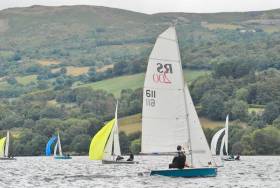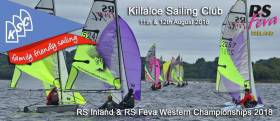Displaying items by tag: RS Inlands
42 RS dinghies across three classes turned out for the RS Inlands 2021 hosted by Blessington Sailing Club.
Teams travelled from as far north as Cushendall in Northern Ireland and as far south as Cork. The West was also well represented by five teams from Killaloe.
17 teams travelled from neighbouring Wicklow club Greystones, showing the significant growth in their RS fleet in recent years.
The three fleets were met with a gusty 20 - 25 knots on day 1, leading to lots of thrills and plenty of spills. With Sunday's forecast looking light, Race Officer Joe Crilly got a fourth race completed on day 1, resulting in a tired fleet on Saturday evening.
The largest fleet was the 400s with 19 teams racing. After day 1, things were very tight at the top, with 3 teams, Peter Bayly & Paddy Blackley, Govan Berridge & Dave Coleman and Marty O'Leary and Kevin Johnson all tied on 7 points as overnight leaders.
 RS dinghy racing at the inland championships at Blessington Sailing Club Photo: Susan Brambell
RS dinghy racing at the inland championships at Blessington Sailing Club Photo: Susan Brambell
The usual bonfire and cans concluded a little earlier than usual with plenty of tired & sore bodies strewn about the lawn at Blessington SC.
Day 2 brought much lighter conditions, with a sunny 5 - 7 knots, and plenty of shifts to make things interesting. Race 5 in the 400's was won by Greystones team Marty O'Leary & Kevin Johnson to put them in the lead going into the final race. O'Leary & Johnson just needed to beat Berridge and Coleman to claim the title in the final race. Paul McLoughlin & Owen McKinley had a great day 2, with two-second places to put them into second overall.
The final results for the 400 fleet was first Marty O'Leary & Kevin Johnson (Greystones SC), second Paul McLoughlin & Owen McKinely (Cushendal) third, Govan Berridge & Dave Coleman (Killaloe)
 Frank O'Rourke and Rachel O'Leary Photo: Susan Brambell
Frank O'Rourke and Rachel O'Leary Photo: Susan Brambell
In the 200 fleets, there were 15 boats competing for the Inland title. Greystones pairing Frank O'Rourke & Rachel O'Leary sailed a stellar regatta, discarding a 1st after 6 races. 2nd place went to Jocelyn Hill and Katie Kane from the County Antrim boat club, who put up a serious fight in every race, with Conor O'Beirne and Grainne Young from RSGYC also posting consistent top three's on day 1. 3rd Overall was Greystones duo of Ruairi O'Cleirigh & Lorcan O'Brien Mc Laughlin.
 RS 400 champions Marty O'Leary and Kevin Johnson Photo: Susan Brambell
RS 400 champions Marty O'Leary and Kevin Johnson Photo: Susan Brambell
The RS Fevas completed four races, with day one being cut short in the big breeze, and three races then run on Sunday. Royal St George teams took the top two spots, with Isobel Bloomer & Oscar Legge taking the inland Championship title, and Lara Little & Grace McNaughton in 2nd, while 3rd place went to Senan Corry & Peadar Doyel from the National Yacht Club.
Full results can be found here
The next RS event will be the Northerns to be hosted by Carrickfergus Sailing Club. The three RS fleets will be joined by the Aero fleet for the first time. Entry link here
Top Performances Despite Strong Winds At RS Inlands
#RS - Dublin-Cork duo Neil Spain and John Downey put in a commanding performance in the RS400 class at the 2018 Inland Championships at Killaloe Sailing Club — the Co Clare club’s first ever RS event — earlier this month.
The forecast was one of extremes, with big breeze promised on the Saturday and virtually nothing expected on Sunday. PRO Robin Gray sent the fleet out in the building breeze with a prospect of four races in light of Sunday’s forecast.
Indeed, it was an arduous day on the water, with the rescue crews kept constantly busy by many thrills and spills in the windy conditions for 38-strong fleet of 400s, 200s, and Fevas contesting their own class Westerns.
Racing got underway amid gusts of up to 25 knots, and Neil Spain and John Downey (Howth/Royal Cork) stormed away to show the fleet how it’s done.
Chris Penny and Jessica Rutherford (Carrickfergus) were chasing hard but couldn’t disrupt the speedsters in front. However, total dominance was not guaranteed, with relative newcomer Sam Pickering and Matt Lloyd — the latter’s first time crewing in a 400 — securing second in race 2, and they eventually secured fourth place behind Robert O’Sullivan and Phil McGlade.
In the RS200s, Frank O’Rourke and Emma Hynes (Greystones) dominated, revelling in the conditions for three bullets and shaking off a disappointing sixth place in the race 1.
Aaron Jones and Rosemary Tyrell were not far away with three seconds and a first, but were destined to be bridesmaids against Frank and Emma’s consistency.
Greg Arrowsmith and Grace O’Beirne (Royal St George) fought hard securing the last spot on the podium against some fierce competition from Helen Rutherford & Katie Kane.
Positions five, six and seven were secured by the top juniors — Joseph Griffiths and Fionn O’Connor (Baltimore), home pair Thomas Drayton and Tadhg O’Mara, and Rosa Lyden and Jane Bolger (Baltimore) — and it proved exciting to see the younger talent shining through.
In the Fevas, Elysia O’Leary and Lily Dwyer (Royal St George) nearly sailed a perfect series, dominating the first three races with three bullets.
The most intense competition was from the smallest and youngest in the fleet. Three boats were tied on seven points after four races with Lily Thorup and Sibeal Nic Giolla Coda (Blessington) taking second place with a win in the last race. Orla Imhoff and Mila la Mignon (Killable) secured third from local rivals David Schutz and Eanna Coleman.
RS Ireland gave great credit to PRO Robin Gray and the race committee for their hard work with the blustery conditions on the Saturday. Tribute was also paid to the organisers, shore teams and catering for keeping the fleet content.
Special mention also went to the sailors of Killaloe who made up nearly a third of the fleet, with 12 entries across 400s, 200s and Fevas.
This fourth event of the 2018 RS season was sponsored by Lyons of Limerick and Waterways Ireland. The next and final event in the 2018 calendar this year the RS Southerns on 15-16 September at Baltimore Sailing Club.
RS400
1st Neil Spain & John Downey (HYC/RCYC)
2nd Chris Penny & Jessica Rutherford (CSC)
3rd Robert O’Sullivan & Phil McGlade
RS200
1st Frank O’Rourke & Emma Hynes (Greystones)
2nd Aaron Jones & Rosemary Tyrell (GSC/RIYC)
3rd Greg Arrowsmith & Grace O’Beirne (RStGYC)
RS200 Junior
1st Joseph Griffiths & Fionn O’Connor (Baltimore)
2nd Thomas Drayton & Tadhg O'Mara (Killaloe)
3rd Rosa Lyden & Jane Bolger (Baltimore)
Feva
1st Elysia O Leary & Lily Dwyer (RStGYC)
2nd Lily Thorup & Sibeal Nic Giolla Coda (Blessington)
3rd Orla Imhoff & Mila la Mignon (Killaloe)
RS Inlands Start Today In Killaloe
#RS - Killaloe Sailing Club is hosting the RS Inland and RS Feva Western Championships this weekend, starting today Saturday 11 August.
The RS sailing community will be out in force on Lough Derg for the weekend, with full camping facilities available at the club and a barbecue set for this evening at 6.30pm.
For more details on the event see the RS Ireland website HERE.

























































